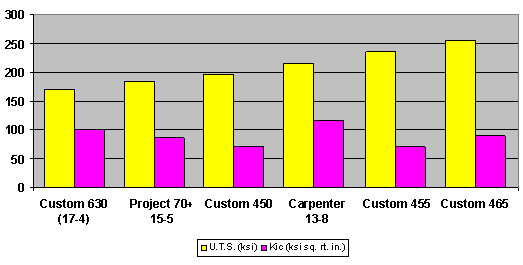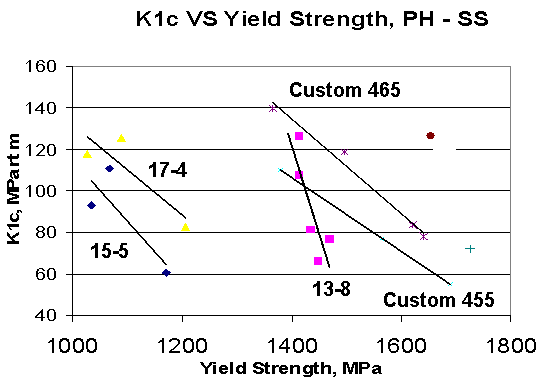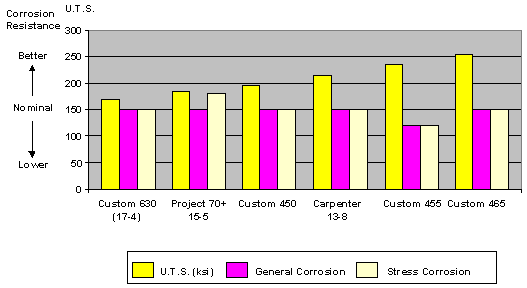Custom 465® Advanced Stainless Flexible for Many Applications
White Papers
Advanced Stainless Offers High Strength, Toughness, and Corrosion Resistance Wherever Needed
Carpenter Technology’s Custom 465® stainless steel (UNS S46500) is a premium double vacuum-melted, martensitic, age-hardenable alloy that offers a unique combination of high strength, toughness, and corrosion resistance. When the alloy was first introduced to the aerospace industry in 1997, its developers felt that the alloy’s properties were so exceptional that they would be of value to other industries as well.
The alloy has greatly exceeded their expectations, finding myriad applications in diverse industries. While the alloy (Fig. 1) continues to meet the special and exacting needs of aerospace manufacturers, it also has found application in marine equipment, firearms, hand tools, oil and gas drilling, and the medical industry among others.
Fig. 1 — Nominal composition of Custom 465 stainless.
Custom 465 stainless is capable of ultimate tensile strength in excess of 250 ksi (1722 MPa) when aged at 950°F (H950 condition). This strength is higher than that of any other historically available precipitation-hardenable (PH) stainless steel long product (Fig. 2). Aging temperatures ranging from 950°F to 1050°F can be selected in order to achieve the desired balance of strength, toughness, and stress corrosion cracking (SCC) resistance.
Fig. 2 — Typical properties of Carpenter Technology's PH stainless steels.
|
Alloy |
||||||
| Condition |
H950 |
H925 |
H900 |
H1000 |
H950 |
H950 |
| Yield Strength MPa (ksi) |
1069 (155) |
1234 (179) |
1296 (188) |
1413 (205) |
1551 (225) |
1648 (239) |
| U.T.S., MPa (ksi) |
1172 (170) |
1269 (184) |
1351 (196) |
1482 (215) |
1620 (235) |
1751 (254) |
| Elongation, % |
15 |
16 |
14 |
13 |
12 |
14 |
| Reduction in Area, % |
50 |
57 |
56 |
55 |
50 |
63 |
| Fracture toughness KIC, MPaÖ m (ksiÖ in) |
110 (100) |
95 (86) |
78 (71) |
127 (115) |
77 (70) |
98 (89) |
| Charpy V-notch energy, J (ft-lb) |
34 (25) |
64 (47) |
54 (40) |
54 (40) |
19 (14) |
27 (20) |
The H950 condition (510ºC) is most commonly used to get higher strength together with good toughness and excellent notch tensile strength. The H1000 condition (538ºC) is chosen to obtain increased toughness at a slightly lower strength level. This condition provides a superior combination of strength, toughness, fabricability, and stress corrosion cracking resistance when compared to other high strength PH stainless alloys such as Custom 455 stainless (UNS S45500) and 13-8 stainless (UNS S13800).
Fig. 3 shows the relative strength and toughness of PH stainless steels, while Fig. 4 shows the relationship between yield strength and fracture toughness of commonly used PH stainless steels.
Fig. 3 — Relative strength and toughness of PH stainless steels.

Fig. 4 — Relationship between yield strength and fracture toughness of Custom 465 stainless.

General corrosion resistance of Custom 465 stainless approaches that of 304 stainless. In both the H950 and H1000 conditions, exposure to 5% neutral salt spray at 95ºF (35º C) (per ASTM B117) caused no rusting after over 2000 hours. Double-cantilever-beam tests conducted in 3.5% NaCl (pH 6) show Custom 465 stainless to possess inherently good resistance to stress corrosion cracking.
Its stress corrosion resistance, furthermore, improves with increasing aging temperature. It is comparable to that of 13Cr-8Ni stainless and Custom 455 stainless steels, but at significantly higher strength – and its resistance is superior to that of both when overaged to the same strength level. Fig. 5 displays the relative strength, general corrosion resistance, and stress corrosion cracking resistance of traditional PH stainless steels.
Fig. 5 —Relative strength and corrosion resistance of PH stainless steels.

Conditions for Use
In today’s competitive business climate, there is a growing list of manufacturers who are focused on lowest life cycle cost, rather than lowest initial cost. This attitude has created a strong worldwide demand for materials options possessing high strength and toughness, having relative ease of fabrication, and providing reliable, long-term service in corrosive environments. Custom 465 stainless can fill all these needs at once.
The patented alloy has been used as a corrosion resistant upgrade to high strength alloy steels, and as a higher strength upgrade to more conventional stainless steels. Unlike alloy steels, Custom 465 stainless requires no surface coating or metal plating to provide corrosion resistance. It thus eliminates the vulnerability of treated surfaces to cracking and subsequent corrosion attack.
In addition to the expense of coating or plating, the environmental issues related to such coatings and their waste solution disposal are an even larger problem. The European Union, for example, is considering a ban on cadmium plating. Even if Cd plating is not entirely banned, new restrictions and regulations could make the cost of disposing used plating baths prohibitive.
A superior strength-to-weight ratio has driven the success of several new products beyond aerospace. The very high levels of strength that can be achieved provide the part designer with the opportunity to either add strength to an existing design or to reduce its weight or size. Even with such high strength levels, Custom 465’s superior fabricability has been key to the success of critical products that could not be made from alternative high strength materials.
The material is typically shipped from the mill in a solution annealed and cold treated condition. In this condition, Custom 465’s structure is a highly ductile iron-nickel martensite with low yield strength and a relatively low rate of work hardening. As such it can easily be formed or shaped via conventional methods before the simple one-step hardening treatment.
Aerospace
Custom 465 stainless was originally designed to help meet demands from the aerospace industry for materials that could keep aircraft flying for 30 years or more with minimum maintenance. The product development timeline for such applications is, of course, much longer than normal for other types of alloys due to the high level of accountability for all parties. Carpenter Technology and partnering aerospace companies discussed and refined goals, and tested alloy samples for seven years before the alloy was fully accepted and qualified as meeting their requirements. It has since been approved and used for structural components such as flap tracks, slat tracks, actuators, engine mounts, and landing gear hardware. Custom 465 alloy is currently covered by the MMPDS-02, AMS 5936, and ASTM A564 specifications.
Custom 465 stainless can be considered as a corrosion resistant replacement for 300M, AISI 4340, and similar types of steels that must be plated or otherwise surface coated to provide corrosion resistance. It can also be considered as a higher strength replacement for stainless steels such as 15Cr-5Ni , 17Cr-4Ni, and 13-8 stainless steels currently in use that have acceptable corrosion resistance, but less-than-desired strength and toughness.
Medical
Cold worked Custom 465 stainless , aged at 900ºF (482ºC), can provide maximum achievable tensile strengths approaching 300 ksi (2070 MPa) for parts with diameters less than 0.75 in. (20 mm). This capability has been useful for making surgical and dental instruments and needle wire for the medical industry. While the more conventional ferritic and martensitic stainless steels sufficed for a long time in making surgical instruments, that landscape has changed.
The evolution of new surgical techniques requires instruments of improved design that do not break, distort, or otherwise fail during surgery. Materials used for the instruments must be strong and tough. The combined high strength and toughness of Custom 465 stainless has allowed instruments to withstand higher operational torque loads during surgery. These properties have facilitated the design of longer and smaller cross-section instruments that are typically required for minimally invasive surgeries.
Superior fracture and impact toughness are also key properties of the alloy when it has been used for surgical tools. At comparable strength levels, Custom 465 has exhibited more than twice the impact resistance of either Custom 455 stainless or 17Cr-4Ni stainless, two alternative precipitation hardenable stainlesses used by the medical industry.
Instruments fabricated from Custom 465 stainless are autoclaveable and resistant to oxidation in a steam environment. The alloy also has been found to be resistant to cleaning and sterilizing solutions and to body fluids and is included in ASTM F899, which is the governing specification for Stainless Steels for Surgical Instruments.
Although not designed specifically for wear and edge retention applications, Custom 465 stainless has been used for instruments, such as scrapers, and cutters with superior results when compared to Custom 455 and 17-4. In addition to the alloy’s use for surgical tools, Custom 465 stainless has served well when used for suture needles due to its combination of high strength, ductility and corrosion resistance.
Oil and Gas Drilling
Drill rigs for oil and gas exploration endure severe costs due to lost production when they have to shut down to repair or replace equipment that has failed. Examples of such critical components are the drive shafts for downhole drilling tools that are commonly used in very harsh environments. Shafts made of EN30B or Astralloy alloy steel, traditional choices for this type of application, would typically last no longer than 150 hours in service before requiring replacement.
NQL Energy Services, a large independent drilling tool supplier in Nisku, Alberta, decided to make the drive shafts on its Black Max line of downhole drilling tools from Custom 465 stainless. As a result, the newly designed shafts and mud motors are lasting up to 1,500 hours before replacement is required, according to NQL. This tenfold increase in service dramatically reduced total replacement costs and the costs associated with lost drill rig production time.
Custom 465 stainless in the H950 condition provided nearly twice the ultimate tensile strength of the alloy steels replaced, along with excellent notch tensile strength and fracture toughness. It also offered superior resistance to general corrosion and stress corrosion cracking.
Firearms Industry
When firearms manufacturer, Sturm Ruger & Co., Inc., Southport, CT developed the world’s first six-shot revolver in a .454 Casull caliber – the Ruger® Super Redhawk® – it used Custom 465 stainless for the cylinder to withstand the enormous pressure generated when firing this powerful cartridge. Designers started with Ruger's proven, rugged .44 magnum platform, planning to modify it to withstand the approximately 62,000 psi pressure produced by the .454 Casull cartridge.
The highest chamber pressure produced by a typical .44 Magnum cartridge is about 42,000 psi. Since the diameter of the chambers in the cylinder had to increase in order to accommodate the larger .454 cartridge, the cross sections between the chambers were reduced in thickness. So Ruger was faced with a design that required a now thinner wall to withstand an essentially 50% higher pressure than in the original cylinder.
To determine whether a breakthrough six-shot .454 Casull revolver was possible, Ruger fabricated a cylinder from Custom 465 stainless, then fired hundreds of rounds at a proof stress of 92,000 psi, approximately 50% higher than the stress produced under standard .454 firing conditions. After this testing, the chambers exhibited no cracking, scratches, or other signs of fatigue.
The alloy’s full range of properties were required to actualize this superb design – high tensile strength, notch tensile strength, fracture toughness, and corrosion resistance. The clean microstructure produced via premium melting and the inherent good machinability of the iron-nickel martensite matrix provided additional advantages in material savings and manufacture.
Marine
Howard Arneson is known for groundbreaking marine racing designs like that of his famous Arneson surface drive propulsion system. He knew he was pushing material limits when he harnessed a 4500 hp Lycoming gas turbine, like those used in US Army helicopters, to just one propeller shaft in his newest catamaran racing boat. This is three times the power load that is normally applied to a marine propulsion shaft.
Zeiger Industries of Canton, Ohio was asked to produce the propeller shaft from 17Cr-4Ni PH stainless steel. Zeiger fabricated a finished shaft measuring 40" long by 2½" in the center, tapering down to 1?" at both ends. After careful installation of the shaft, the powerful racer was taken for a test cruise on the Pacific Ocean. Following 50 hours of running time at speeds around 100 mph, the shaft broke off, dropping to the bottom of the sea with its propeller.
A new shaft made from Custom 465 stainless was produced and placed into the catamaran. The engine was tested under exceedingly severe loading conditions. The initial test involved accelerating the catamaran to 100 mph in just 12 seconds, which was accomplished successfully. The catamaran was then accelerated to 175 mph, and held for several hours at that speed. For approximately four months, the catamaran was cruised at sustained high speeds, 50 to 100 miles at a time, several times a week without any trace of a problem.
After this extended period of intense service, the propeller was removed and no marks or signs of wear were found even where the propeller engages the spline. This serves to illustrate the advantages of Custom 465 over other PH stainlesses as it matches them in resistance to stress corrosion cracking while providing markedly higher strength.
Hand Tools
High-performance hand tools made from Custom 465 stainless offer a unique combination of attributes that have been considered useful to the medical, biomedical, biotech, pharmaceutical, food, nuclear, marine, and other industries concerned with cleanroom sterility and/or exposure to corrosive environments.
SteriTool™, Div. of Nautitool, Inc., Brooklyn, NY, specializing in stainless steel tools, has used the alloy for a full line of conventional screwdrivers, L- and T-pattern hex keys, and ball-end L-pattern hex keys. These tools are reported to combine high strength, high hardness, high toughness, and the torque capability of the most suitable carbon steels, with superior resistance to both general and stress corrosion cracking. All of the tools are autoclaveable and resistant to surface oxidation in a steam environment.
Mill forms
Despite its highly alloyed content, Custom 465 stainless can be produced, with consistent properties, in most commonly used long forms: flat, square, and round bar; wire; rod; strip, and forged billet up to 16" round. The company is also investigating the manufacture of hot rolled plate, having rolled a number of trial plates. This development could facilitate the fabrication of parts close to stock size and reduce the cost of machining parts.